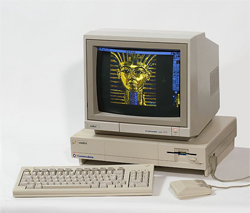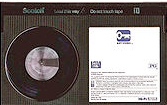The 20 Greatest Tech Underdogs of All Time
A heartfelt celebration of products and technologies that try harder.By Harry McCracken | Thursday, November 5, 2009 at 1:57 am
5. Amiga
 What it was: A line of personal computers originally sold by Commodore in the 1980s and early 1990s. (Yes, I know Amiga lives on, implausibly, as an operating system–but it’s no longer an underdog. Today’s Amiga is an oddity.)
What it was: A line of personal computers originally sold by Commodore in the 1980s and early 1990s. (Yes, I know Amiga lives on, implausibly, as an operating system–but it’s no longer an underdog. Today’s Amiga is an oddity.)
Underdog to: PCs–and, to some degree, Macs. Maybe even the lowly Atari ST. Basically, any computing platform that sold better than the Amiga did, or seemed like it might do so.
Notable virtues: Exceptional multimedia and mulitasking, starting in an era when most computers didn’t do multimedia and multitasking; a pioneering desktop video machine.
What made it an underdog: Nine letters: C-O-M-M-O-D-O-R-E. The company may have sold more computers than anyone else in the 1980s, but it didn’t really know what it had in the Amiga. If you were a fan of the platform–and I was–you generally harbored a nagging suspicion that Commodore was trying to murder it through lousy advertising and boneheaded strategic moves. (The company itself died in 1994.)
Random factoid: In 1993, the Amiga spawned the Amiga CD32, which Commodore claimed was the first CD-based gaming console.
 4. Linux
4. Linux
What it is: An open-source operating system initiated by Finnish student Linus Torvalds in 1991.
Underdog to: A closed-source operating system called Windows.
Notable virtues: Solid; modest hardware requirements; safe from Windows security issues; infinitely customizable; can be tailored to run anything from a server to a cell phone; the original shining example of how an open-source community can change the world.
What makes it an underdog: I mentioned Linux started out as the personal project of a Finnish student, right? By the time it attracted the attention of folks other than hardcore nerds, it was the late 1990s and Microsoft had made sure that Windows was utterly entrenched on desktop PCs. Also, while Linux long ago got about 90 percent of the way to being an operating system so intuitive that just about anyone can use it without much training, the last ten percent has proven to be a major challenge.
Random factoid: Linux’s omnipresent penguin mascot, Tux, was designed by Larry Ewing as an entry for a 1996 Linux contest. It didn’t win.
3. Betamax
 What it was: Sony’s videotape format, which made quite a splash in home VCRs starting in the mid-1970s.
What it was: Sony’s videotape format, which made quite a splash in home VCRs starting in the mid-1970s.
Underdog to: VHS, the competing format championed by JVC–which was originally supposed to play underdog to Betamax.
Notable virtues: Every serious video aficionado I knew back in the day favored Betamax. (Which didn’t stop me from buying a VHS recorder when I plunked down my money in 1985.) Beta had better picture quality; it had hi-fi sound first; the machines were well engineered. I know folks who still pull out their players from time to time.
What made it an underdog: I’d pin most of the blame on running time–Beta started at an hour, and while it later increased, VHS (which used a larger cartridge) was always a step ahead. I remember the era when some prerecorded movies came out on one tape for VHS but required two for Beta. And far more companies made VHS players than Beta ones, helping to popularize the format and driving prices down. Betamax had a successful low-key second life as a professional standard, but it became an underdog so quickly in the consumer market that it remains a synonym for “superior technology beaten by inferior rival” to this day.
Random factoid: Betamax’s great achievement may have been legal rather than technical–when Disney and Universal sued Sony over its VCR’s potential for copyright infringement, Sony won, establishing consumers’ right to timeshift TV broadcasts. We could use a similar victory or two today in cases such as this one.
2. AMD
![]() What it is: The world’s second-largest manufacturer of x86 microprocessors and related components, with around 11.5 percent of the overall market.
What it is: The world’s second-largest manufacturer of x86 microprocessors and related components, with around 11.5 percent of the overall market.
Underdog to: Intel, the inventor of x86 and the company whose products hold most of the other 88.5 percent of the market.
Notable virtues: Has sometimes made processors that trumped Intel’s offerings in performance (the original Athlon and Opteron come to mind); even when it hasn’t, has provided competition that has played a huge role in increasing the technological sophistication of PC processors and driving down their price.
Why it’s an underdog: AMD would tell you it’s at least partially because of unfair tactics by former partner and eternal archrival Intel (which it sued in 2005 on anti-trust grounds). New York Attorney General Andrew Cuomo apparently agrees. Other factors: Conservative consumers and corporate buyers who believe (mistakenly) that there’s something inherently more compatible about an Intel chip than an AMD one, and the fact that Intel CPUs are by far the most lavishly-marketed components ever to sit inside a computer. And maybe the fact that AMD’s core business is making chips compatible with the x86 standard that Intel devised means its DNA is that of an underdog.
Random factoid: AMD produced its first Intel-compatible processor in 1975, so 2010 will mark its 35th anniversary as an underdog.
1. Mozilla Firefox
 What it is: An open-source Web browser based on the code that originated with Netscape Navigator, the most popular browser of the mid-1990s.
What it is: An open-source Web browser based on the code that originated with Netscape Navigator, the most popular browser of the mid-1990s.
Underdog to: Microsoft’s Internet Explorer, the default browser on Windows PCs and still the browser with the largest market share by far.
Notable virtues: Simple to use; thousands of extensions make it amazingly customizable; impervious to an array of hacker attacks that target IE weaknesses; excellent support for Web standards; boasts innovative features such as the AwesomeBar. Also–and this is why it’s our #1 underdog–it performed an enormous service to the Internet-using people of the world by rebooting browser competition years after it seemed that IE would reach as close to 100% market share as it’s possible for an application to achieve.
What makes it an underdog: It started out feeling like an extreme underdog, since IE’s marketshare was so monopolistic and other attempts to compete with it (such as the earlier incarnations of Mozilla) had flopped. Even today, it’s an underdog–it has a long way to go before its market share surpasses IE’s, and even highly successful open-source projects must rely on the work of volunteers.
Random factoid: Firefox was originally going to be called Phoenix. Then trademark issues forced Mozilla to redub it Firebird. Then further copyright issues led to it becoming Firefox–a much, much better name than either Phoenix or Firebird.
There you go. Let the debate begin..
«PREVIOUS PAGE 1 2 3 4
21 Comments
Read more:
20 Comments For This Post
1 Trackbacks For This Post
-
Interesting Factoids about Tech Underdogs | dec0der Says:
November 23rd, 2009 at 3:07 pm[…] looking at this list of The 20 Greatest Tech Underdogs of All Time from Technologizer, and while it’s as subjective as any other list, there’s a few […]













November 5th, 2009 at 3:39 am
I wouldn’t call Firefox an udnerdog, since it has about a 25% market share. When you consider there are some other great alternative browsers out there, like Chrom, Safari and Opera, I don’t think Firefox deserves a much bigger market share: the others on the other hand, do.
November 5th, 2009 at 6:40 am
See the definition of underdog Bouke, It still has less then the leader for which it is compared to (IE). It is still an underdog since it is behind.
November 5th, 2009 at 8:05 am
It’s also an underdog because Mozilla doesn’t have anywhere near the resources or muscle of it’s main competitor Microsoft.
November 5th, 2009 at 8:12 am
What, was the TI-99/4A too obscure?
November 5th, 2009 at 8:21 am
I used to temporarily switch from Windows (1? 2?) to the GEM interface ’cause a lot of things were easier and more intuitive to accomplish in GEM than in Windows.
I sold the TRS-80 back in the day. Nobody knew what to do with it at the time.
I went with the Sega game-system over Nintendo — great system, tons of enjoyable memories, no longer made. Uh-hem.
I was a WordStar fan, but switched to WordPerfect when WS languished. I sure can pick ’em, huh?
Had a Commodore computer too, continuing my nearly unbroken streak of hitching to the wrong wagon.
I guess those experiences have (finally) made me cautious when it comes to adopting an underdog (I’m MS/Intel all the way — though I am loath to admit it).
November 5th, 2009 at 8:22 am
Oh no! Now I’m gonna have that Sonic theme music in my head all day! My son still plays some of his Sega games. SAAAAA-GAAAA…. North Coast Muse @ http://sally1029.wordpress.com
November 5th, 2009 at 8:31 am
We must not forget that what seems to be an underdog product might be a starting products or business that continues to improve itself and finally coming out as the winner in the middle of tough competition that we see today.
November 5th, 2009 at 8:38 am
Millard, I wondered why the TI-99/4a was missing as well. Texas Instruments lavishly marketed the computer for a while there, even hiring Bill Cosby as their spokesperson (“This is the one!”). In my own circles, the TI was a clear favorite over the Commodore VIC-20, but when the 64 came out, all bets were off. The cost of expanding the TI to include disk drives, more memory, and a serial interface were just too great.
http://danakennedy.wordpress.com
http://oldcameras.wordpress.com
November 5th, 2009 at 9:10 am
Firefox is the cat that ate the cream, I’d say.
November 5th, 2009 at 10:28 am
How can I take seriously an article that says an underdog “must be good–maybe better, in fact, than its more successful rivals” and then include the Zune? 🙂
November 5th, 2009 at 10:34 am
I’d probably like this more if it were underdog restaurants or food, but that would be a different blog.
The plural of human interface “mouse” is “mouses” not “mice.”
Umm, Screenwriter is the underdog to Final Cut, does that count?
Cool stuff, but I’m not as big a geek as I thought…
November 5th, 2009 at 11:13 am
Firefox has also often been known as “FoxFire”, to folks that are not tech geeks like us. But they’ve happened to see Firefox at some point in their computing lives, and apparently are dyslexic when it comes to that name, for some reason.
November 5th, 2009 at 4:16 pm
I wish firewire didn’t dissapear. I loved using it back in the day.
November 5th, 2009 at 7:23 pm
Macs aren’t underdogs anymore, for one thing, in hardware, Macs are very good quality, good graphics card (they don’t pack it full of garbage to sell it for less), etc., and in software, OS X is infinitely better than windows. And they are becoming the top dog with their brilliant marketing.
November 5th, 2009 at 8:07 pm
Looked up the Maltron keyboards. I’d probably buy one if it wasn’t $400. Guess I’ll just use KMFL to imitate it.
November 5th, 2009 at 8:42 pm
wow that’s unreal
November 6th, 2009 at 6:14 am
I on a Mac, and enjoy it, but I don’t have any kind of air of superiority about it. Some people need one, some don’t. Some people prefer one over the other – that’s their prerogative. I also have an HP laptop that works just fine, so I can’t complain about one over the other. I will say that I am not a fan of IE and its issues with “fixing” HTML code and reformatting pages in weird ways (more a problem of previous versions, like IE6 and IE7), but, that’s what Firefox is for.
November 6th, 2009 at 10:35 am
My mistake with my earlier comment, the Maltron prices are listed in pounds. It’s actually around 620 USD.
November 9th, 2009 at 5:36 am
I was hoping you’d mention GeoWorks, an OS that came out four months after Windows 3.0 and was, according to Computerworld, what Windows should have been. It was more technologically advanced, attractive, and came bundled with all the apps to get you started. It was also the first DOS-based platform for America Online. It ran on my then anemic hardware, and it had a small but loyal following for a few years – I was a user. It was a victim of the superior marketing power of Windows and it was a challenge for developers to write applications for it.
March 26th, 2011 at 1:28 pm
You’ve made quite a few interesting points. I’m not sure if we see eye to eye on everything, but then again, who does? I must consider it more. Nice article regardless, thanks and ta ta! (Added this to FeedBurner, so enjoy! :))